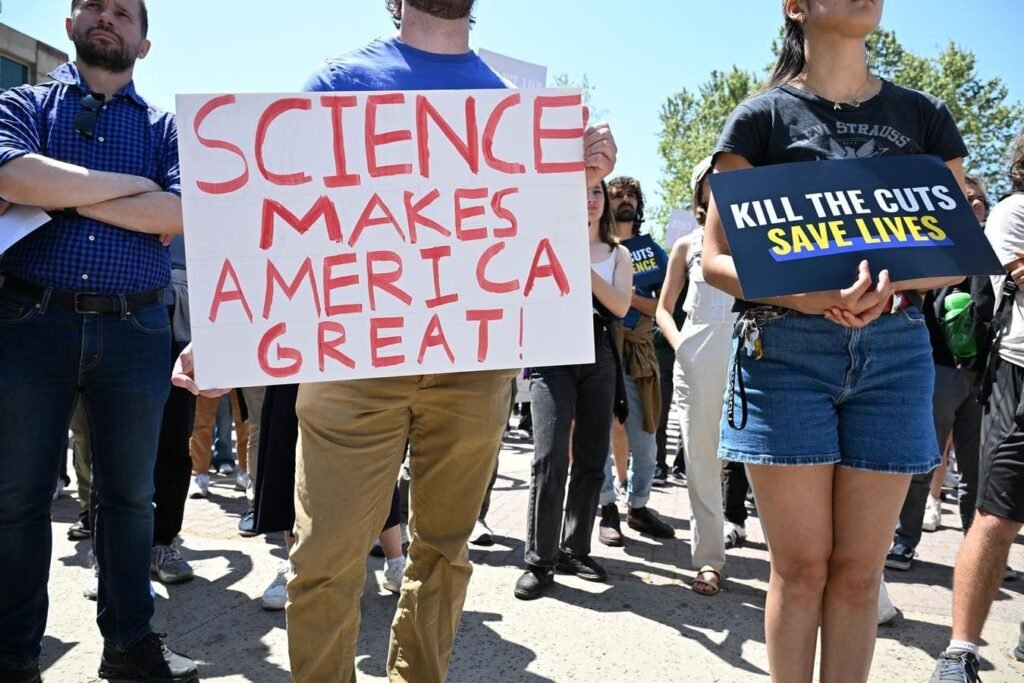UCLA students, researchers and demonstrators rally during a “Kill the Cuts” protest against the … More
AFP via Getty Images
Robert F. Kennedy Jr. and the Department of Governmental Efficiency have made drastic cuts to research funding throughout the Health and Human Services agencies. The radical reductions struck the National Institutes of Health particularly hard, throwing universities and research centers into a panic and scramble to see what might be salvaged. The severe budget cuts will leave lasting harm to research projects and toe the careers and personal lives of many researchers. Here’s what several researchers said about the toll on them and their research study participants.
I spoke with two Yale researchers who focus on mental illness and homelessness who have abruptly lost their grant funding. They and others reportedly received the same form letter: “This award no longer effectuates agency priorities. Research programs based primarily on artificial and non-scientific categories, including amorphous equity objectives, are antithetical to the scientific inquiry, do nothing to expand our knowledge of living systems, provide low returns on investment, and ultimately do not enhance health, lengthen life, or reduce illness. Worse, so-called diversity, equity, and inclusion (“DEI”) studies are often used to support unlawful discrimination on the basis of race and other protected characteristics, which harms the health of Americans. Therefore, it is the policy of NIH not to prioritize such research programs.”
One researcher said that what was particularly painful was what felt like a betrayal of trust to the community. Part of the grant was employing and training unhoused people. “We were able to pay people and restore some justice. That was one of the more heartbreaking things” about losing the grant. The participants had a “platform where they could impact the system they depend on. We set out to empower their voices, and it feels bad not to deliver on what we said.” She added that “pulling the rug out harms that trust and our ability to approach” them in the future.
Many university researchers are expected to fund their positions and staff through research grants. On a personal note, she said the loss of funding is “terrifying as someone who is junior in my career” because these research grants are the “trajectory to promotion.” Researchers have had to fire staff and, without their grants, are likely to lose their position with the university, and that could lead to losing their home and disrupting their children’s schooling by having to move.
The other researcher noted that their community partners “are the experts in this project, and they’ve been dropped.” Trying to look on the bright side of this trauma, she added, “it’s forced us to be able to talk to a wider spectrum of people about why our work is important” and to think about how to convince someone that this research is worth doing.
Paige Jarreau’s Silenced Science Stories is an illustrated series of portraits of other scientists whose work has been affected or who have been forced out of their research by budget cuts or firings.
Harvard’s Brittany Charlton, an epidemiologist and founding director of the LGBTQ Health Center of Excellence, anticipated these kinds of cuts coming well before many others did and has long been used to being targeted, as are abortion researchers. She observed that they are in a different grief space than those who are just beginning to realize what is happening to them. Because of those experiences, she is much more outspoken and wrote an excellent article about why she is suing Kennedy.
“Science should not be subject to political whims,” she notes, and having certain topics fall into disfavor is a “violation of both congressional mandates and the NIH’s own strategic plan.”
In our interview, she stressed that she (and others) had a five-year grant and that Congress has the authority to allocate funds under the Constitution. “So having the President say, ‘We’re canceling your existing grants because they don’t align with our executive orders’ is just so illegal.”
Her suit notes that these were existing contracts, and breaching them violates the Constitution as well as contractual law. She had “about $15.9 million dollars [in NIH grants], and at least another $5.9 [million] of that still needed to be spent in order to complete” her research projects. “All of that money was then terminated,” wasting the entirety of the funding and the years of effort.
The U.S. has already invested so much, and “ then to cut it off is maybe the least efficient thing you could think of.” While Charlton notes these grant terminations mark “the end of my center, the end of my career,” she focused more on the losses to the community, all the study volunteers and public health advances.
The suit also targets NIH and its director, Dr. Jay Bhattacharya, as well as HHS and Kennedy, who leads it. Other plaintiffs in the suit include the American Public Health Association, United Auto Workers (which represents a number of postdocs and students), Ibis Reproductive Health, professor Katie Edwards, postdoc Nicole Maphis and Peter Lurie (president of Center for Science in the Public Interest), who all had grants canceled.
The effect of these abrupt cuts in funding from HHS across each of these agencies is translating into an exodus of researchers from the U.S. to other countries, many of which have been long-term rivals. The U.S. is losing its cutting edge and ability for long-term innovative research.
What each of the researchers I interviewed emphasized was the importance of making decisions based on scientific evidence.


